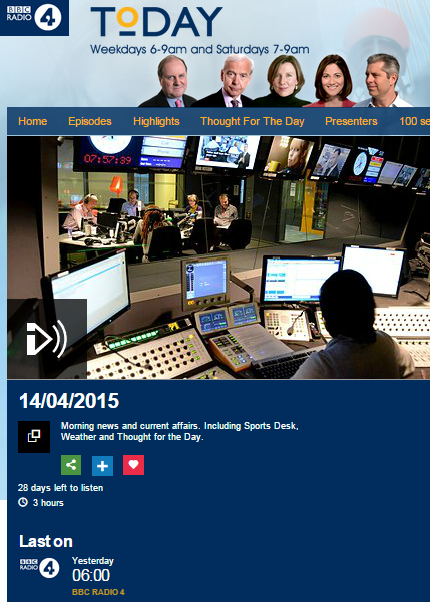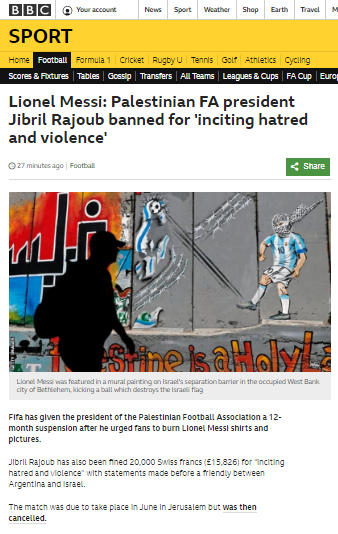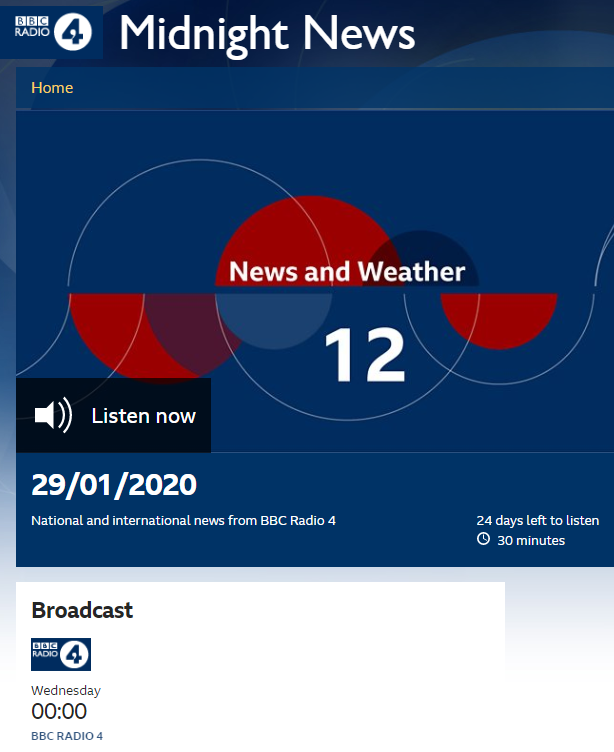h/t: MG, SI
The April 14th edition of BBC Radio 4’s flagship news and current affairs programme included an interview (available here for a limited period of time from 01:49:45) with Cardinal Vincent Nichols on the subject of his recent visit to displaced Christian communities in Iraq.
Immediately after that interview, presenter Mishal Husain brought in Jeremy Bowen (from 01:54:35) for further analysis of the issue of the plight of Christian communities in Iraq as described by Cardinal Nichols and listeners heard an ‘interesting’ interpretation of the cause of Islamist violence against Christians in that country.
MH: “On the line is our Middle East editor Jeremy Bowen. Jeremy, listening to Cardinal Nichols, it’s a reminder that although we may see the fight against IS and the position in the Middle East at the moment often through sectarian…in sectarian terms and through that sort of prism, this has been traditionally a religiously diverse part of the world.”
JB: “Yes. In Syria and Iraq there was a delicate mosaic – a very interesting mosaic – of different faiths which really has been shattered now. In Iraq, in the last…since 2011…since the war started there…sorry; in Syria I should say…2011…but in Iraq it’s been going on since the invasion by American-led forces in 2003 in that since then, the population of Iraqi Christians has been reduced pretty much by more than half. And there have…it’s been a catastrophe for them which started before the rise of Islamic State, which started as a consequence of the invasion. And if you talk to the Christian communities in other parts of the Middle East as I often do, a lot of them will look to that example of Iraq and say we do not want to be like Iraq and now they’ll also say of course we don’t want to be like what’s been happening in Syria too.” [emphasis added]
Following a question about the possibility of Iraqi Christians from the Nineveh Plains being able to return to their homes, Husain said:
MH: “Perhaps we’ve only just recently woken up to the reality of what’s been happening to minority communities in this part of the world because of all the headlines and the attention that’s been grabbed by Islamic State. From what you’re saying, this is a much longer phenomenon.”
JB: “Well, Christians have been leaving the Middle East for an awfully long time. There are well-established groups of émigré Middle Eastern Christians in all sorts of countries – in South America for example; one region of the world. But…ehm…what has changed; the rise of extreme Islam – which of course has resulted in the killing of many Muslims – has also resulted over the last ten years or so in a lot of Christian communities being dislocated and it’s become particularly acute since the rise of Islamic State. And it’s not just Islamic State either: Christians in Egypt feel very threatened there by different kinds of religious extremism. There is still a large community of Christians in Egypt, also in Lebanon – they’re pretty well established in Lebanon and strong but they again feel pressure. And Palestinian Christians as well feel threatened from not just of course from extreme Islam, but they also feel threatened by what the Israeli government might be doing. So all round the place when you look at it, it’s difficult.” [emphasis added]
Bowen of course provided no fact-based support for his fallacious claim that Palestinian Christian communities are “threatened” by Israel and neither did he inform listeners that the Christian community in Israel is both safe and thriving.
But no less remarkable is the fact that Bowen would clearly have listeners believe that, in terms of threats to Middle East Christian communities, “what the Israeli government might be doing” (whatever that bizarre phrase is supposed to mean) can and should be seen as being on a par with the religiously motivated persecution and slaughter of Christians (and of course other minorities) by Islamist extremists.
And that, dear readers, is from the man whose entire job was created with the stated intention of “providing analysis that might make a complex story more comprehensive or comprehensible for the audience”.




